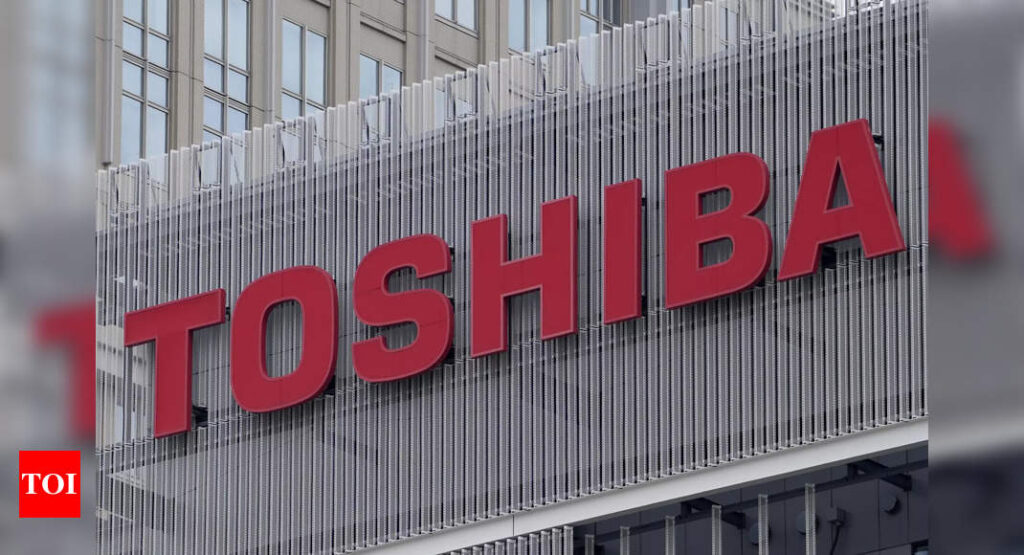[ad_1]
Private equity fund Japan Industrial Partners Inc.’s successful tender offer for Toshiba Corp paves the way for a ¥2 trillion ($13.5 billion) buyout that would end the electronics group’s 74-year-long run as a listed entity.
Toshiba, whose roots go back to 1875, said Thursday the JIP-led consortium now holds 78.65% of all its shares. That clears the way for the domestic fund to squeeze out the remaining shareholders and take full control of the company in what is set to be Japan’s biggest deal this year.
The Tokyo-based company’s delisting from the Tokyo Stock Exchange would close a troubled decade at the firm, marked by scandal, crippling losses and clashes with activist shareholders that have slowed the company’s ability to innovate.
Governance issues may persist, however. Toshiba’s lenders are asking that ousted Chief Operating Officer Goro Yanase take up a leading role in management, people familiar with the matter said. Yanase stepped down earlier this year to take responsibility for inappropriate entertainment expense claims. But he was instrumental in paving the way for the take-private deal and has experience in Toshiba’s nuclear power business — key to any turnaround, the people said.
Sumitomo Mitsui Banking Corp and other banks financing the buyout via ¥1.2 trillion in loans are also pushing for their own representatives in leadership positions, said the people, who asked not to be named as the matter is private. There is opposition within the company about Yanase’s return, and the appointment may not take place, the people said.
A Toshiba representative said that nothing has been decided at this time, adding that JIP and Toshiba will discuss the company’s management structure after privatization.
A lengthy auction process has kept the inventor of the world’s first laptop and of flash memory in limbo during a year of sector-wide change brought about by surging interest in artificial intelligence. In the interim, Toshiba’s chip affiliate Kioxia Holdings Corp has fallen further behind market leaders Samsung Electronics Co and SK Hynix Inc, while talks to merge with Western Digital Corp’s flash memory business dragged on.
Toshiba executives and lenders have said privatization will allow Toshiba to focus on longer-term strategy. The company, whose businesses include nuclear power plants, power semiconductors, batteries and hard-disk drives, has circled through three presidents in as many years.
Once celebrated for its technology breakthroughs, Toshiba paid what was Japan’s largest-ever penalty for falsifying financial statements in 2015. It then suffered a disastrous foray into the nuclear business that forced it to take a $6.3 billion writedown and sell off its crown jewel memory-chip business, reorganized as Kioxia. It’s also hived off its medical, home appliances and TV operations.
Activists began circling the troubled company and, in 2021, it announced plans to split into three units, only to revise that plan in favor of a two-way split in 2022. The chief executive at the time resigned to take responsibility for the chaos, after which the board began soliciting bids to take the company private.
Toshiba, whose roots go back to 1875, said Thursday the JIP-led consortium now holds 78.65% of all its shares. That clears the way for the domestic fund to squeeze out the remaining shareholders and take full control of the company in what is set to be Japan’s biggest deal this year.
The Tokyo-based company’s delisting from the Tokyo Stock Exchange would close a troubled decade at the firm, marked by scandal, crippling losses and clashes with activist shareholders that have slowed the company’s ability to innovate.
Governance issues may persist, however. Toshiba’s lenders are asking that ousted Chief Operating Officer Goro Yanase take up a leading role in management, people familiar with the matter said. Yanase stepped down earlier this year to take responsibility for inappropriate entertainment expense claims. But he was instrumental in paving the way for the take-private deal and has experience in Toshiba’s nuclear power business — key to any turnaround, the people said.
Sumitomo Mitsui Banking Corp and other banks financing the buyout via ¥1.2 trillion in loans are also pushing for their own representatives in leadership positions, said the people, who asked not to be named as the matter is private. There is opposition within the company about Yanase’s return, and the appointment may not take place, the people said.
A Toshiba representative said that nothing has been decided at this time, adding that JIP and Toshiba will discuss the company’s management structure after privatization.
A lengthy auction process has kept the inventor of the world’s first laptop and of flash memory in limbo during a year of sector-wide change brought about by surging interest in artificial intelligence. In the interim, Toshiba’s chip affiliate Kioxia Holdings Corp has fallen further behind market leaders Samsung Electronics Co and SK Hynix Inc, while talks to merge with Western Digital Corp’s flash memory business dragged on.
Toshiba executives and lenders have said privatization will allow Toshiba to focus on longer-term strategy. The company, whose businesses include nuclear power plants, power semiconductors, batteries and hard-disk drives, has circled through three presidents in as many years.
Once celebrated for its technology breakthroughs, Toshiba paid what was Japan’s largest-ever penalty for falsifying financial statements in 2015. It then suffered a disastrous foray into the nuclear business that forced it to take a $6.3 billion writedown and sell off its crown jewel memory-chip business, reorganized as Kioxia. It’s also hived off its medical, home appliances and TV operations.
Activists began circling the troubled company and, in 2021, it announced plans to split into three units, only to revise that plan in favor of a two-way split in 2022. The chief executive at the time resigned to take responsibility for the chaos, after which the board began soliciting bids to take the company private.
[ad_2]
Source link











More Stories
India’S Growth Forecast: S&P ups India’s FY’24 growth forecast to 6.4% on robust domestic momentum
India to remain fastest-growing major economy, but demand uneven: Poll
Jack Ma: Jack Ma gets back into business with ‘Ma’s Kitchen Food’